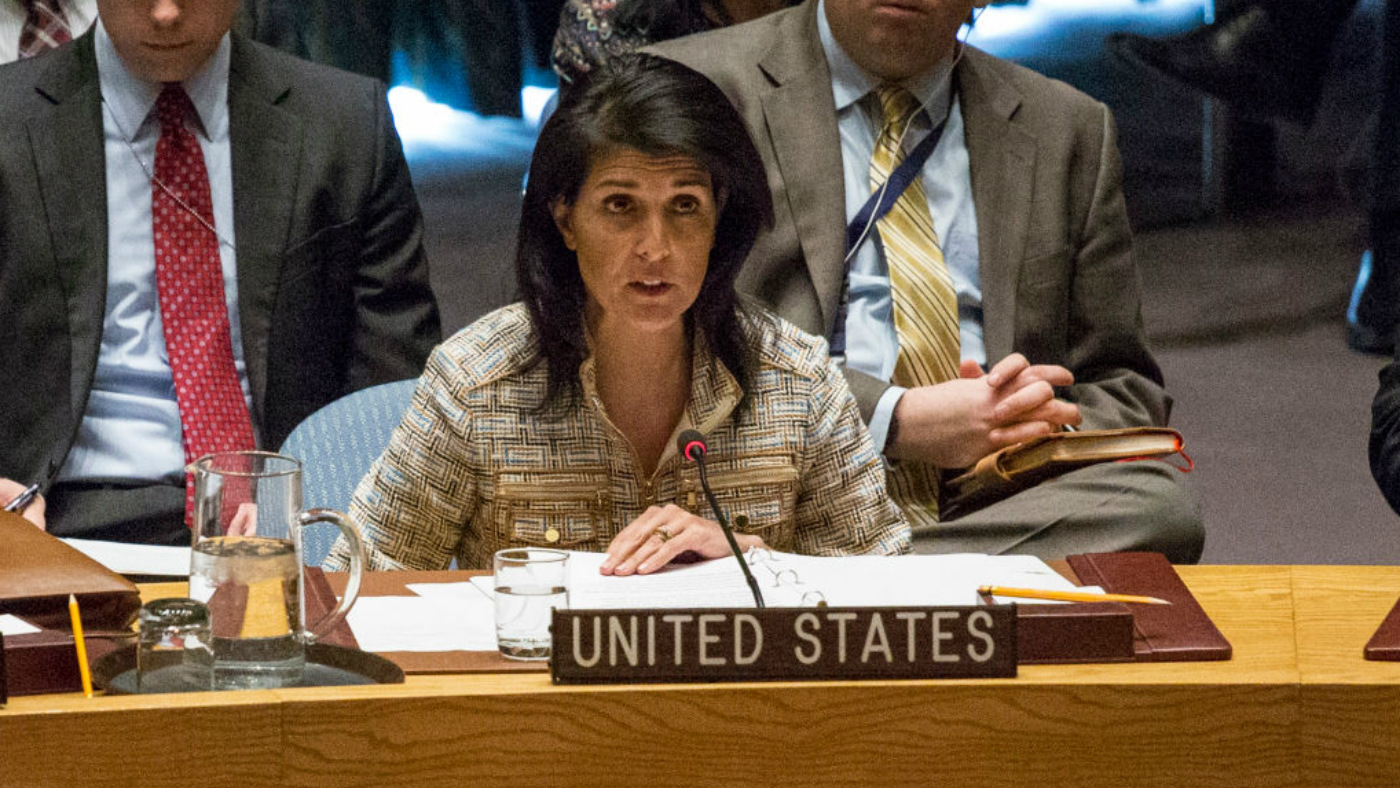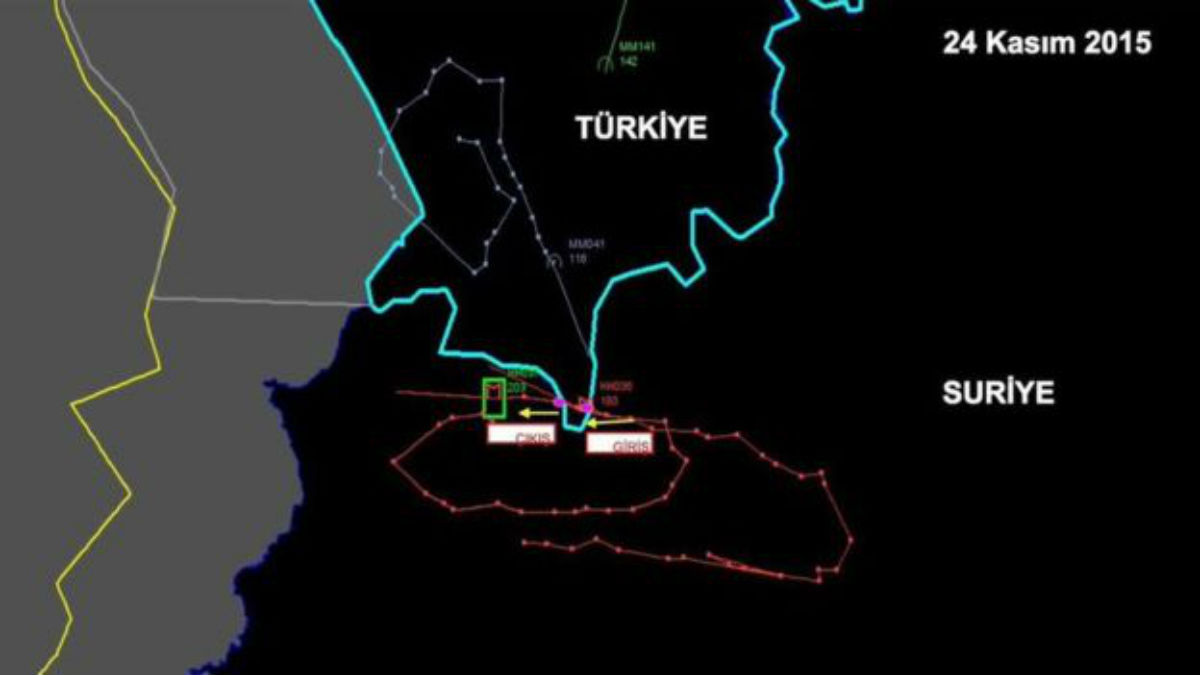US and Russia spar over vetoed Syria sanctions
Anger as Moscow blocks UN sanctions over regime's use of chemical weapons

A free daily email with the biggest news stories of the day – and the best features from TheWeek.com
You are now subscribed
Your newsletter sign-up was successful
Turkey shoots down Russian jet: what now for diplomacy?
25 November
Russian president Vladimir Putin has warned of "serious consequences" after Turkey shot down a Russian military aircraft near the Turkish-Syrian border.
According to Russia's defence ministry, one of the pilots was killed after he was shot at from the ground while parachuting from the plane. The second pilot is said to be "alive and well" at a Russian air base in Syria after he was picked up by the Syrian army.
The Week
Escape your echo chamber. Get the facts behind the news, plus analysis from multiple perspectives.

Sign up for The Week's Free Newsletters
From our morning news briefing to a weekly Good News Newsletter, get the best of The Week delivered directly to your inbox.
From our morning news briefing to a weekly Good News Newsletter, get the best of The Week delivered directly to your inbox.
A marine involved in their rescue attempt was also killed when his helicopter came under fire from rebels.
It marks the first time a Nato member has shot down a Russian aircraft since the Cold War, risking a "dangerous increase in international tensions", says The Independent.
Turkey and Russia disagree about where the Russian Su-24 was flying when it was hit by air-to-air missiles fired by Turkish F-16s. Putin insists it was flying over Syrian territory and described the attack as a "stab in Russia's back by terrorists' helpers". Sergei Lavrov, the Russian foreign minister, has cancelled a planned visit to Turkey and warned Russians against travelling to the country.
However, Turkey's president Recep Tayyip Erdogan says the plane strayed into Turkish air space and claims his forces had acted within their rules of engagement.
A free daily email with the biggest news stories of the day – and the best features from TheWeek.com
Speaking to the Daily Mail, Sir Michael Graydon, former head of the RAF, questions whether it was "absolutely necessary" for Turkey to shoot down the plane. "One aircraft was not going to change the course of history and now it probably will. Shooting down the aircraft has caused a monstrous diplomatic problem."
Middle East expert Shashank Joshi from the Royal United Services Institute says the incident was proof of the "toxic cocktail" of dangers in the region, which could easily erupt into crisis. "The situation is dangerous because Russia is quite probably deliberately probing Turkish air space both for military reasons and political reasons," he says. If Moscow responds provocatively, Joshi warns, there is a risk of the crisis escalating. "These things always proceed in a very unpredictable fashion. We have seen how conflicts can begin when there are large alliances," he says.
But, in the Daily Telegraph, Dr Natasha Kuhrt from King's College London says Putin's "harsh rhetoric is likely to be more for domestic consumption than real substance", while Turkey's need for Russian energy is one factor that might provide an opportunity for diplomacy and reducing tensions.
Turkey and Russia may not be friends but neither country can afford an escalation, says Sam Kiley, foreign affairs editor at Sky News. "This is such a recipe for war that it won't be allowed to happen," he says. "Not, that is, if sense prevails in a region where no sense has prevailed for too long."
Nato meeting called after Russian jet shot down by Turkey
24 November
An extraordinary Nato meeting has been called after a Russian military jet was shot down by Turkish warplanes near the Syrian border this morning.Turkish military officials claim the jet was violating Turkish airspace over the town of Yayladagi, in Hatay province. Two F-16s fired on an unidentified aircraft at 9.24am local time (7.24am GMT) after issuing ten warnings over a five-minute period, they said.However, Russia's defence ministry denies that its Su-24 violated Turkish airspace. Russian President Vladimir Putin condemned what he called "a stab in Russia's back by terrorists' helpers". He insisted that the Su-24 had been shot down over Syrian territory, 1km from the Turkish border, and crashed in Syrian territory, 4km from the border."Our pilots and our plane did not in any way threaten Turkey. It is quite clear," he said. The president claimed they had been carrying out an operation against Islamic State, including militants who originated from Russian territory and who could "return to Russia at any time".The two pilots ejected before the jet crashed, but unconfirmed reports from Syrian rebels on the ground suggest they may have died, reports Sky News.TV footage in Turkey showed a jet descending in flames in a woodland area, trailed by a long plume of smoke. The extraordinary Nato session is due to be held at 4pm GMT, at Turkey's request. One Turkish official said: "This isn't an action against any specific country: our F-16s took necessary steps to defend Turkey's sovereign territory."Russian and Turkish leaders have been discussing how to tackle Islamic State, which operates in Syria and now Iraq.Putin first launched air strikes in Syria at the end of September. However, many of its bombs appear to have been directed at non-IS groups fighting the regime of Syrian President Bashar al-Assad, increasing tensions with the United States and its allies.Turkey, a staunch critic of Assad, has previously complained that a Russian warplane violated its airspace near the Syrian border, forcing the country's military to scramble two fighter jets to intercept it.
"This is exactly the kind of incident that many have feared since Russia launched its air operations in Syria," says Jonathan Marcus, BBC defence correspondent. "The dangers of operating near to the Turkish border have been all too apparent."

According to the Turkish Armed Forces, this is the path the Russian plane took, which shows it flying across Turkey's southern-most tip, in Hatay province.
Russia and France in unlikely alliance against Islamic State
18 November
In an unlikely alliance, Russia has said it is coordinating with France to increase attacks in Syria, particularly areas held by Islamic State.
Today US President Barack Obama said he too was open to cooperation with Russia in the campaign against IS, which claimed responsibility for last week's deadly Paris attacks and the downing of a Russian plane over Sinai.
The timing of Russia's announcement – after France launched a wave of attacks against IS and called for a united front – suggests Moscow is "using the moment to help repair frayed relations with the West", says the New York Times.
Ending his diplomatic isolation could be an "important first step in persuading the West to lift sanctions on his wobbly economy imposed because of the Ukraine dispute", says the newspaper.
French president Francois Hollande and Russian President Vladimir Putin have spoken by telephone and are due to meet next week in Moscow.
In a live military briefing, televised across Russia yesterday, the Kremlin announced that a "massive air strike" was targeting IS sites in Syria.
In a scene that "could have been lifted from a James Bond film", Putin, his defence minister Sergei Shoigu and scores of military men were lined up in a three-story military command centre with a map of Syria "the size of a movie screen" on one wall, says the NYT.
Russia's announcement comes amid a number of bomb threats across the world. A football match between Germany and the Netherlands was called off last night because of an "intention to ignite explosives". German Chancellor Angela Merkel was due to attend the 49,000-capacity Hannover stadium, but an evacuation began less than two hours before kick-off.
Two Air France planes heading out of the United States were also diverted because of bomb threats. Both flights landed safely and were later given the all-clear.
In the UK, MPs have sanctioned air strikes against IS targets in Iraq, but not Syria. According to the Daily Telegraph, Prime Minister David Cameron is prepared to hold a vote on military action in Syria as early as next month if he can win enough support from MPs.
-
 Quiz of The Week: 14 – 20 February
Quiz of The Week: 14 – 20 FebruaryQuiz Have you been paying attention to The Week’s news?
-
 The Week Unwrapped: Do the Freemasons have too much sway in the police force?
The Week Unwrapped: Do the Freemasons have too much sway in the police force?Podcast Plus, what does the growing popularity of prediction markets mean for the future? And why are UK film and TV workers struggling?
-
 Properties of the week: pretty thatched cottages
Properties of the week: pretty thatched cottagesThe Week Recommends Featuring homes in West Sussex, Dorset and Suffolk
-
 Greenland’s capital becomes ground zero for the country’s diplomatic straits
Greenland’s capital becomes ground zero for the country’s diplomatic straitsIN THE SPOTLIGHT A flurry of new consular activity in Nuuk shows how important Greenland has become to Europeans’ anxiety about American imperialism
-
 Epstein files topple law CEO, roil UK government
Epstein files topple law CEO, roil UK governmentSpeed Read Peter Mandelson, Britain’s former ambassador to the US, is caught up in the scandal
-
 Iran and US prepare to meet after skirmishes
Iran and US prepare to meet after skirmishesSpeed Read The incident comes amid heightened tensions in the Middle East
-
 Syria’s Kurds: abandoned by their US ally
Syria’s Kurds: abandoned by their US allyTalking Point Ahmed al-Sharaa’s lightning offensive against Syrian Kurdistan belies his promise to respect the country’s ethnic minorities
-
 Israel retrieves final hostage’s body from Gaza
Israel retrieves final hostage’s body from GazaSpeed Read The 24-year-old police officer was killed during the initial Hamas attack
-
 China’s Xi targets top general in growing purge
China’s Xi targets top general in growing purgeSpeed Read Zhang Youxia is being investigated over ‘grave violations’ of the law
-
 Syria’s Islamic State problem
Syria’s Islamic State problemIn The Spotlight Fragile security in prison camps leads to escape of IS fighters
-
 Panama and Canada are negotiating over a crucial copper mine
Panama and Canada are negotiating over a crucial copper mineIn the Spotlight Panama is set to make a final decision on the mine this summer